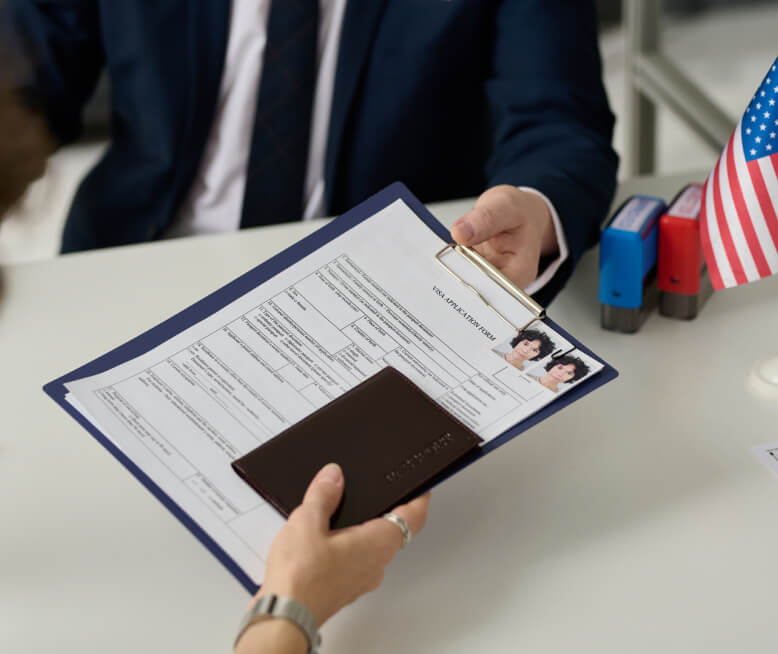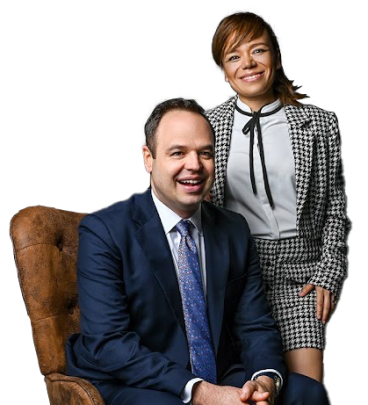At De Wit Immigration Law in Miami, our work visa attorneys focus on employment-based immigration, offering comprehensive support for businesses and foreign professionals alike.
Our team handles all aspects of employment-based immigration, from temporary work visas to permanent residency applications. Whether you’re an employer seeking to bring in international talent or a foreign professional or entrepreneur looking to work in the United States, we offer personalized strategies to streamline your immigration process and achieve your goals. Read on to and learn how an employment visa lawyer from our team can help you!
Common Employment Visa Types
The United States offers several visa options for foreign nationals seeking to work in the country
H-2B Visa for Temporary Non-Agricultural Workers
The H-2B visa program allows U.S. employers to bring foreign nationals to the United States to fill temporary non-agricultural jobs. Key features include:
- Designed for seasonal, peak load, or intermittent need
- Annual cap of 66,000 visas, with some exceptions
- Requires a temporary labor certification from the Department of Labor
- Initial stay of up to one year, extendable in increments of up to one year, with a maximum stay of three years
- The employment must be for a limited period of time, such as a one-time occurrence, seasonal need, peak load need, or intermittent need
O-1 Visa for Individuals with Extraordinary Ability in Arts, Sciences, Education, Business, or Athletics
The O-1 visa is for individuals who have demonstrated extraordinary ability in arts, sciences, education, business, or athletics. Key features include:
- Requires evidence of sustained national or international acclaim
- Must demonstrate extraordinary ability through extensive documentation
- No annual cap on the number of O-1A visas issued
- Initial stay of up to 3 years, with extensions possible in 1-year increments
- Spouse and unmarried children under 21 may accompany the O-1A visa holder
- No degree requirement, but must prove extraordinary ability in the field
- Can be sponsored by an employer or by an agent, allowing the visa holder to work for multiple employers
L-1 Visa for Intracompany Transferees
The L-1 visa allows multinational companies to transfer certain employees to their U.S. offices. There are two subcategories:
- L-1A for executives and managers
- L-1B for employees with specialized knowledge
Both require the employee to have worked for a related foreign entity for at least one year within the past three years.
Key features include:
- Issued for 1 or 3 years initially, then in 2-year increments, up to a maximum of 7 years for L-1A workers or 5 years for L-1B workers
- Spouses automatically authorized to work and children under 21 authorized to study in the U.S.
- “Dual intent” – may apply for green card without compromising visa status and travel abroad during the green card process
TN Visa for Mexican and Canadian Professionals
The TN visa is available to citizens of Canada and Mexico under the United States-Mexico-Canada Agreement (USMCA), formerly known as NAFTA. It offers a streamlined process for qualified professionals in specific occupations to work in the U.S. temporarily. Key features include:
- Streamlined processing at the consulate for Mexicans and at the airport or border for Canadians
- Simple eligibility requirements – a U.S. job offer and university degree or diploma for most occupations
- No lottery or annual cap on the number of visas issued
H-1B Visa for Specialty Occupations
The H-1B visa is one of the most sought-after employment visas for professionals in specialty occupations. To qualify, applicants typically need at least a bachelor’s degree or equivalent experience in a specific field. Key points to consider:
- Annual quota system with limited availability
- Requires employer sponsorship
- Initial stay of up to 3 years, extendable to 6 years
H-1B1 Visa for Chilean and Singaporean Professionals
The H-1B1 visa is a variant of the H-1B for citizens of Chile and Singapore. Important aspects include:
- No annual quota, offering more flexibility
- Requires a job offer in a specialty occupation
- Issued in 1-year increments, renewable indefinitely
- Simpler application process compared to standard H-1B
E-3 Visa for Australian Professionals
The E-3 visa is similar to the H-1B but exclusively for Australian citizens in specialty occupations. Key features include:
- No annual quota, avoiding the lottery system
- Requires a job offer in a specialty occupation
- Issued in 3-year increments, renewable indefinitely
- Simpler application process compared to standard H-1B
E-1 Treaty Trader Visa
The E-1 visa is for individuals engaged in substantial trade between their country and the U.S. Key features include:
- Available to nationals of countries with a qualifying treaty with the U.S.
- Requires substantial trade primarily between the U.S. and the treaty country
- Trade can include goods, services, technology, or other types of international exchange
- Initial stay of up to 5 years, renewable indefinitely
- Spouses automatically authorized to work and children under 21 authorized to study in the U.S.
E-2 Treaty Investor Visa
The E-2 visa is for those who have made a substantial investment in a U.S. business. Important aspects include:
- Available to nationals of countries with a qualifying treaty with the U.S.
- Requires a substantial investment of personal funds in a US business
- The business must be more than marginal, meaning that it has a potential for growth and job creation
- Initial stay of up to 5 years, renewable indefinitely
- Spouses automatically authorized to work and children under 21 authorized to study in the U.S.
P Visas for Athletes and Artists
P visas are available for athletes, artists, and entertainers. There are different subcategories:
- P-1A: For internationally recognized athletes
- P-1B: For members of internationally recognized entertainment groups
- P-2: For performers under reciprocal exchange programs
- P-3: For artists or entertainers coming to perform, teach, or coach under a culturally unique program
R Visas
The R-1 visa is for religious workers coming to the U.S. to work in a religious capacity. To qualify, the individual must have been a member for at least two years of a religious denomination that has a bona fide non-profit religious organization in the U.S.
Employment-Based Green Cards
For those seeking permanent residency through their business or profession, there are numerous employment-based green card options:
EB-1A: Individuals with Extraordinary Ability
The EB-1A category is for individuals who have extraordinary ability in sciences, arts, education, business, or athletics.
Key features include:
- Can self-petition.
- No job offer or labor certification required
- Must demonstrate extraordinary ability with evidence meeting at least 3 out of 10 specific criteria set by USCIS
EB-1B: Outstanding Professors and Researchers
The EB-1B category is for internationally recognized professors and researchers. Key features include:
- Requires a job offer for a tenure-track position or comparable research position
- Must have at least 3 years of experience in teaching or research in your field of recognition
- Need to prove international recognition by meeting at least 2 out of 6 specific criteria set by USCIS
- Employer must file petition on behalf of the applicant
EB-1C: Multinational Executives and Managers
The EB-1C category is for executives and managers transferring to a U.S. branch of their company. Key features include:
- Requires a job offer from a U.S. employer with a qualifying relationship to a related entity overseas
- Must have worked for the company abroad as a manager or executive during at least 1 of the past 3 years
- U.S. company must have been doing business for at least 1 year
- No labor certification required
EB-2: Advanced Degree Professionals or Individuals of Exceptional Ability
The EB-2 category is for professionals with advanced degrees or individuals with exceptional ability. Key features include:
- Requires an advanced degree or exceptional ability in sciences, arts, or business
- Generally requires a job offer and labor certification
- National Interest Waiver (NIW) available for self-petition without job offer or labor certification
- Priority date must be current for green card application
EB-3: Skilled Workers, Professionals, and Other Workers
The EB-3 category includes skilled workers, professionals, and other workers. Key features include:
- Skilled workers require at least 2 years of job experience or training
- Professionals must have a U.S. bachelor’s degree or foreign equivalent
- Other workers category for positions requiring less than 2 years of training or experience
- Requires a job offer and labor certification
- Longer wait times due to annual numerical limits
PERM Labor Certification and Fast-Track Green Card Options
The EB-2 and EB-3 employment-based green card categories generally require a PERM Labor Certification, a long and technical process involving the Department of Labor. This process aims to ensure that hiring a foreign worker will not adversely affect U.S. workers. Navigating PERM can be challenging, but our team at De Wit Immigration Law simplifies the process for you.
Special programs exist that allow some green card applicants to avoid the lengthy PERM labor certification process and “fast track” their path to a green card:
- The National Interest Waiver (NIW) allows some EB-2 professionals to self-petition without a job offer if their work is in the national interest of the United States. This can be a game-changer for many professionals, especially those in STEM fields.
- The Schedule A program recognizes a labor shortage in certain occupations and allows applicants with a job offer in those fields to skip the PERM labor certification process:
- Schedule A, Group I fast-tracks green card petitions for professional nurses and physical therapists
- Schedule A, Group II streamlines permanent residence for degree professionals in the “sciences and arts” who demonstrate “exceptional ability” and “widespread acclaim and international recognition”
EB-5: Business Investors
The EB-5 category is for investors in U.S. businesses. Key features include:
- Minimum investment of $1.05 million (or $800,000 in some cases)
- Must create 10 full-time jobs for U.S. workers
- Initial conditional green card valid for 2 years
- Must apply to remove conditions before the 2-year period ends
There are two main investment routes under the EB-5 program:
- Direct Investment allows investors to directly invest in and actively manage their own commercial enterprise in the United States. This route provides more control over the investment and may be more suitable for entrepreneurs who want to run their own businesses. The investor is responsible for creating and documenting the required 10 full-time jobs within their specific business entity. While this option offers more autonomy, it also requires more hands-on management and may involve higher risk.
- Regional Center Investment offers a more passive investment option. Investors can place their capital in government-approved regional centers, which pool funds for larger development projects. These centers handle most of the administrative work and are responsible for meeting job creation requirements. Jobs can be created indirectly through the economic impact of the investment. This option often involves large-scale projects like real estate development and may be more attractive to investors seeking a less active role in managing their investment.
Both investment routes offer paths to permanent residency, but they cater to different investor profiles and risk appetites. Our team at De Wit Immigration Law can help you assess which option aligns best with your goals and circumstances and guide you through the application process to maximize your chances of success.
Discuss Your Work Visa Options with De Wit Immigration Law
Navigating the U.S. immigration system requires more than just filling out forms. It requires a deep understanding of the law, current policies, and how they apply to your specific situation. At De Wit Immigration Law, we offer:
- Strategic planning for visa applications
- Ensuring compliance with USCIS regulations
- Assisting with appeals and complex cases
Our track record of success in litigating and appealing immigration matters before immigration agencies and in federal court means we’re equipped to fight for you every step of the way.
Don’t leave your immigration future to chance. Contact De Wit Immigration Law today to schedule a consultation. Let us put our knowledge and experience to work for you, guiding you through the complexities of U.S. immigration law and helping you achieve your goals. Your journey towards working in the United States starts here.
Frequently Asked Questions
An employment-based visa is a document that allows a foreign national to enter and work in the United States legally. These visas are issued to individuals based on their business investment, professional credentials or achievements, or sponsorship and a job offer by a U.S. employer or agent. Employment-based immigration options can be temporary (nonimmigrant) and result in a visa or permanent (immigrant) and result in a green card.
The process to obtain a U.S. employment-based visa or green card can differ significantly based on the type of visa requested, whether it is processed in the United States or abroad, and other circumstances. However, they all follow these same general steps:
- Determine the appropriate visa category based on your qualifications and job offer.
- In most cases, have a job offer from a U.S. employer who is willing to sponsor you.
- Document the visa application. Some visa types require substantial evidence. Many applicants underestimate this step!
- The foreign national or their employer files applications with one or more U.S. federal agencies, including the U.S. Citizenship and Immigration Services (USCIS), the U.S. Department of Labor (DOL), U.S. Customs and Border Protection, or the U.S. Department of State (DOS).
- In most cases, participate in a visa interview at a U.S. embassy or consulate abroad.
- If approved, live and work in the United States!
The specific process can vary depending on the type of visa and individual circumstances. Working with an experienced immigration attorney can help ensure you follow the correct procedures.
The processing time for employment visas can vary significantly depending on several factors, including the type of visa, current government processing times, and individual circumstances. Generally, the process to obtain a temporary visa can take anywhere from a few weeks to several months. Completing the various steps required to obtain permanent residence (a green card) can typically take at least one year (or several!).
Some visa categories offer premium processing for an additional fee, which can significantly reduce wait times. Importantly, though, faster processing doesn’t guarantee visa approval.
The terms “work permit” and “work visa” might sound similar, but there are important distinctions:
- An employment-based or work visa is a document stamped on your passport that allows you to enter the United States to work or run a business. It’s issued by a U.S. embassy or consulate abroad. Principal employment-based visa holders (and spouses of L-1 and E-2 visa holders) don’t need a separate employment permit to work in the U.S.
- A work permit, officially known as an Employment Authorization Document (EAD), is a card issued by USCIS that proves you’re allowed to work in the U.S. It’s typically issued to individuals who are already here in an immigration status, program, or process that allows them to legally remain in the United States but does not authorize them to work by default. For example:.
- F-1 students authorized for Optional Practical Training (OPT)
- Certain H-4 visa holders
- Temporary Protected Status (TPS) holders
- Green card and asylum applicants
Whether you are a foreign investor or entrepreneur, a U.S. employer of any size, or an individual seeking to immigrate based on your talent or a close family relationship, we offer straightforward immigration strategies to advance your personal and professional goals.

-
I’m an Entrepreneur
-
I’m an Employer
-
I’m an Individual

I am extremely satisfied with the professional services provided by Jose and his team. Their profound knowledge of immigration law, coupled with exceptional customer service, ensured all my doubts and questions were promptly addressed. Highly recommended.



